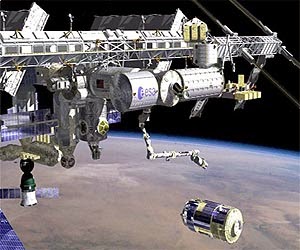Russia is developing a national program of manned space explorations which will replace the International Space Station (ISS) program after 2020, the Russian Federal Space Agency, Roscosmos, said Thursday.
"The development of the national strategy of manned spaceflight is underway now."
"Along with the Russian Academy of Sciences and the industrial sector we are preparing a certain concept beyond the ISS," Roscosmos Deputy Chief Sergei Savelyev told reporters at the 18th St. Petersburg International Economic Forum.
China and the European Space Agency (ESA), he added, were seen as the potential partners in the new strategy, but the key role will belong to Russia.
Russian Deputy Prime Minister Dmitry Rogozin, who is in charge of space and defense sectors, said earlier in the week that Moscow had no plans to extend the operation of the ISS beyond 2020, though the United States had proposed to extend ISS cooperation after that year.
On Tuesday, Rogozin also threatened that from June 1 Moscow would shut down 11 U.S. Global Positioning System (GPS) base stations on Russian territory in response to Washington's anti-Russia sanctions and its refusal to plant Russian Glonass ground base stations on U.S. territory.
Meanwhile, Roscosmos plans to resume talks over the placement of Glonass stations in the United States over the next few weeks, Savelyev said.
"I think it will happen in the very near future, over the next two or three weeks. It would still give us a chance to walk away from the unpleasant situation over sanctions and continue cooperation," the Interfax news agency quoted the official as saying.
"The development of the national strategy of manned spaceflight is underway now."
"Along with the Russian Academy of Sciences and the industrial sector we are preparing a certain concept beyond the ISS," Roscosmos Deputy Chief Sergei Savelyev told reporters at the 18th St. Petersburg International Economic Forum.
China and the European Space Agency (ESA), he added, were seen as the potential partners in the new strategy, but the key role will belong to Russia.
Russian Deputy Prime Minister Dmitry Rogozin, who is in charge of space and defense sectors, said earlier in the week that Moscow had no plans to extend the operation of the ISS beyond 2020, though the United States had proposed to extend ISS cooperation after that year.
On Tuesday, Rogozin also threatened that from June 1 Moscow would shut down 11 U.S. Global Positioning System (GPS) base stations on Russian territory in response to Washington's anti-Russia sanctions and its refusal to plant Russian Glonass ground base stations on U.S. territory.
Meanwhile, Roscosmos plans to resume talks over the placement of Glonass stations in the United States over the next few weeks, Savelyev said.
"I think it will happen in the very near future, over the next two or three weeks. It would still give us a chance to walk away from the unpleasant situation over sanctions and continue cooperation," the Interfax news agency quoted the official as saying.







No comments:
Post a Comment